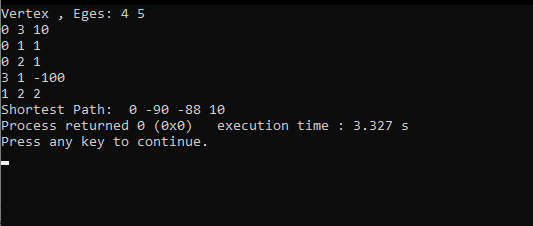1. Take a weighted graph as input. Find shortest cost from source node to all other nodes using Bellman ford algorithm.
#include<stdio.h>
#include<vector>
using namespace std;
struct edge
{
int src, dest, weight;
}temp;
int n;
int dis[100], par[100];
vector<edge> edgeList;
void bellmen_ford(int src)
{
for(int i=0; i<n-1;i++){
for(int j =0 ; j < edgeList.size();j++){
int u = edgeList[j].src;
int v = edgeList[j].dest;
int w = edgeList[j].weight;
if (dis[v] > dis[u] + w && dis[u] != 99999){
dis[v] = dis[u] + w;
par[v] = u;
}
}
}
for(int j =0 ; j < edgeList.size();j++){
int u = edgeList[j].src;
int v = edgeList[j].dest;
int w = edgeList[j].weight;
if(dis[u]!= 99999 && dis[u]+w < dis[v]){
printf("Graph contains negative w cycle \n");
return;
}
}
}
int main()
{ int u, v, w, i;
int e;
printf("Vertex , Eges: ");
scanf("%d %d", &n, &e);
for (i = 0; i < e; i++){
scanf("%d %d %d", &u, &v, &w);
temp.src = u;
temp.dest = v;
temp.weight = w;
edgeList.push_back(temp);
}
for (i = 0; i < n; i++){
dis[i] = 99999;
par[i] = -1;
}
int src = 0;
dis[src] = 0;
bellmen_ford(src);
printf("Shortest Path: ");
for (i = 0; i < n; i++){
printf(" %d",dis[i]);
}
return 0;
}
